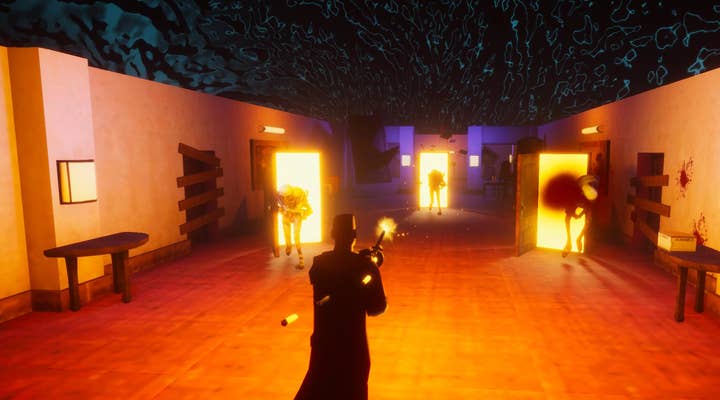Xalavier Nelson Jr. on making money and happy players "without exploding in the process"
The Strange Scaffold CEO discusses sustainability in the games industry and learning in real-time
Sign up for the GI Daily here to get the biggest news straight to your inbox
Xalavier Nelson Jr., CEO of Strange Scaffold, is working through what sustainability means in the games industry during a time of economic uncertainty.
"I don't think sustainability is a utopian idea," he tells GamesIndustry.biz in a discussion at the DICE Summit. "It's just a necessity. Everything you do cannot guarantee survival, but you should at least create the conditions for it to occur.
"One of the disturbing things about the current state of games is that all of the conditions exist in the ecosystem for great things to be made for players consistently, without destroying people in the process."
"Everything you do cannot guarantee survival, but you should at least create the conditions for it to occur"
Nelson says the opportunities to make things stable and better for workers are being ignored. Meanwhile, in the AAA space, the industry is taking its chances for larger profit margins and the next big hit.
Nelson says, "I think giant games deserve to exist and play a special place in our ecosystem. But every space in games is escalating, and every space in entertainment in general is escalating. (You can certainly see this in Hollywood). It means we are confronting an environment where our games are not simply allowed to be fun, profitable, meaningful experiences for players."
Given the ongoing reactions to the current economic downturn, such as fewer investments, Nelson believes that the industry needs to learn from previous lean periods.
"I think we are ignoring a lot of the lessons of history in the current escalation that is being pursued throughout the games industry," he says.
"Because if we just make reasonable decisions based on the ecosystem before us, the desires of our players, and the potential that we now have thanks to the advancement in accessibility technology, again, we can make a lot of money and make a lot of players happy without exploding in the process."

He explains that on an industry wide level is a cauterization of two distinct categories of business operations.
Nelson explains, "The first one is the AAAA normal. A lot of people were joking very recently about AAAA being used for Skull and Bones by Ubisoft's CEO. I think it's fair to call [out] the complexity of systems, gameplay, and graphics that's happening across the AAA sector when you're spending hundreds of millions of dollars on a project that's not just AAA anymore."
He continues, "On the other end of the spectrum, you have these partisan boutique experiences crafted by focused teams, projects that can reach people in specific ways that a bigger project cannot. Dave The Diver is a perfect example. It had to be produced by an offshoot of Nexon."
Nelson believes studios can change their production processes to create a game like Dave the Diver, which was made by Nexon's MintRocket studio and sold three million copies in January.
The CEO explains that the current industry landscape for AA and smaller games is precarious, just as is the case for other industry sectors.
"The problem that games face is that these two things separate and become their own entities. The middle is deeply dangerous. It looks like losing face to say we're going to make smaller focused projects so our players can get distinct [and] better experiences," he says.
"The middle is deeply dangerous. It looks like losing face to say we're going to make smaller focused projects so our players can get distinct [and] better experiences"
Regarding growing costs, Nelson says that the industry has already reached a breaking point through the waves of layoffs. He describes this as a consequence of the present market and business operations.
"Look at the layoffs and look at the declining player numbers. Games that only work and only fulfill their function if they can maintain 2 million concurrent players per day regularly," says Nelson.
"If they don't hit those numbers, we either see this studio close down or projects that have a five, six, seven-year [development] cycle get closed down midway. We lose again on what could have been made if the original shape of the production was just to make a great game that reached players and made its money back."
Nelson believes that people need to observe the economy and the layoffs to answer whether the game industry is sustainable. Still, the Strange Scaffold CEO believes that, eventually, the industry will ride out this rough patch.
"I think we got to live through a distinct moment in time where companies could conglomerate to such a scale that you saw Embracer exist as it did in its prime," he says. "Now that the conditions for producing those companies have gone away. I don't think we'll ever see something exactly like it ever again."
He says that Strange Scaffold exists because of a want for running a studio with achievable scale and targets.
"Part of the reason I fight so strongly to say great games can be made for $1,000, $5,000, $20,000 is because, among other things, that's something that feels achievable. It feels like something that says that studio heads aren't just white guys with money," Nelson explains.
"It says that a studio head can be anyone who fairly compensates their collaborators and makes a fantastic game for players. Strange Scaffold is just one expression of that, where we will continue to produce fantastic experiences for players and survive when the rest of the industry does not necessarily care whether or not it will."

Regarding survivability, Nelson notes that he is also purposefully transparent about his studio's performance. In an interview with IGN last year, he explained the financial circumstances of El Paso Elsewhere around the time of its launch.
He tells us, "I talk a lot about how Strange Scaffold is trying to make things better, faster, cheaper, and healthier... If I don't talk about failings and lessons we discover along the way…then quite simply it isn't honest."
To keep the effort going, the studio has a ride-along program. For two weeks, people interested in the game maker can view its entire production process "warts and all," Nelson explains.
"During 2023, we had people go through that program, and they asked, 'Hey, so it looks like you're making some really cool stuff. But I'm also actively seeing ways that you're struggling right now. Why are you letting me see this?' What I said was, 'If we don't show you the bad stuff, the good stuff doesn't matter; you have to see all of it,'" he says.
Nelson understands why the industry focuses on successes and not failures.
"Everybody loves a winner. This is something that I think a lot of people ran to in 2023. To a degree, this has harmed our relationship with players, the people [that] love to help and support winners when you're nominated for awards," he explains.
"When you can say you've got a certain number of concurrent players, the doors open for you to achieve further success. Success begets success, the projection of success seems to beget success. But if you're struggling, that's when you tend to be ignored. I think it's reality. I think it's sad."
"Success begets success...But if you're struggling, that's when you tend to be ignored. I think it's reality. I think it's sad"
Another reality of development he wants to address is burnout, something he's experienced several times working in the games industry and which remains prevalent alongside industry market concerns.
"...Our conversations around burnout are still deeply limited because it isn't just a number of hours where crunch is a thing that contributes to burnout," he explains. "But burnout is holistic, and there's a lot of developers who are burning out right now, not even just because they got directly laid off, but because they exist in an industry – that they now must existentially confront does not care about them – while trying to deliver a great experience with their players.
"They have to work on a game for months, if not years, knowing that the game that they released is not going to be well received by the general press and player base. Burnout results from dev environments where you don't know if anything you make will end up in the shipped game or if the game will ship at all."
Nelson continues, "What we've created is an environment where, unfortunately, developers are expected to and do deliver miracles while standing on universally unstable ground. So their creative lives are in the process of getting cut in half because that creative life span is getting actively shortened."
Sign up for the GI Daily here to get the biggest news straight to your inbox





.jpg?width=291&height=164&fit=crop&quality=80&format=jpg&auto=webp)



